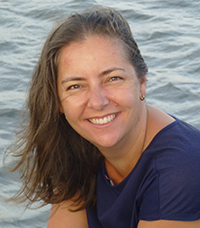
However, these rights are rarely achieved according to Dr Suzanne Hopf (pictured), a Fiji-based researcher in the Charles Sturt University (CSU) School of Community Health.
Dr Hopf said, “The Universal Declaration of Communication Rights acknowledges that communication is a human need, and as such, it is the role of all governments and their citizens to remove barriers to successful communication and create societies in which communication capacity is naturally enhanced.”
In countries where there are no speech-language pathologists and limited formal and informal knowledge about typical communication development, Dr Hopf said that communities need to conduct Communication Capacity Research before embarking on service development projects for people with communication disabilities.
While the term ‘communication capacity’ has been used in fields as diverse as cell biology, socio-linguistics, public health, and disability studies, in Dr Hopf’s research, which looks at communication capacity related specifically to a person’s ability to interact meaningfully regardless of context, communication mode, or language they choose and with whomever they choose to participate.
“The Communication Capacity Research I conducted in Fiji revealed a complex inter-related network of factors within the individual experience, and across community, national, and international levels, that interact to influence service development that supports building communicative capacity,” Dr Hopf said.
The Communication Capacity Research identified that the Fijian community has enacted international and local legislation to ensure that the human right to communicate is afforded to all Fijians regardless of communication delay, disability, or difference.
“The Fiji Disability Bill, enacted this week, is a step closer to realising this human right and closing the gap between policy and practice,” Dr Hopf said.
“Actions recommended by the research reiterated the urgent need: (1) to train local communication specialists who understand the unique linguistic and cultural capital within this region, and (2) for future advocacy efforts in Fiji to nurture enabling beliefs about communication capacity within the community so that Fijians with communication difficulties can exercise communication choices and be active, productive members of the society.”
Dr Hopf said her research, recently published in the special issue of the International Journal of Speech-Language Pathology titled, ‘Communication is a human right: Celebrating the 70th Anniversary of the Universal Declaration of Human Rights’ (2018, Volume 20, issue 1), may assist speech-language pathologists who are interested in improving service provision for people with communication difficulties in other under-served communities where an individual’s human right to communicate is yet to be realised to their full potential.





Social
Explore the world of social